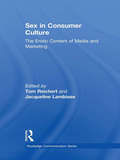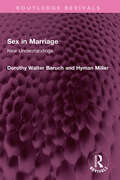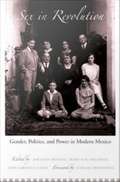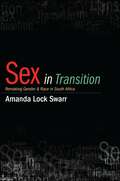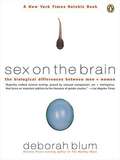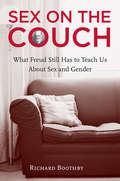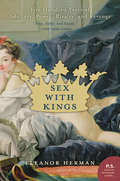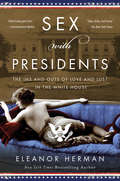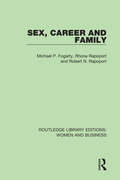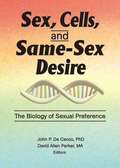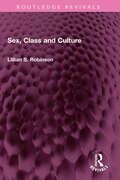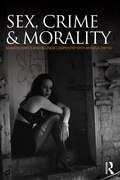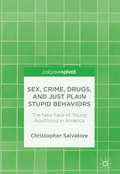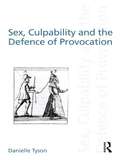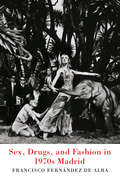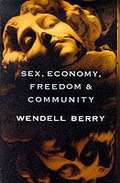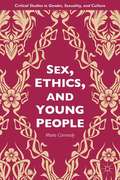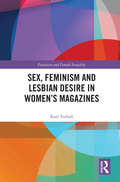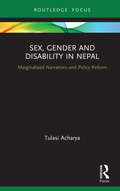- Table View
- List View
Sex in Consumer Culture: The Erotic Content of Media and Marketing (Routledge Communication Series)
by Tom Reichert Jacqueline LambiaseSex in Consumer Culture: The Erotic Content of Media and Marketing considers the use of sex to promote brands, magazines, video games, TV programming, music, and movies. Offering both quantitative and qualitative perspectives from leading scholars in a variety of disciplines, this volume addresses a range of integral issues such as media promotion, racial representations, appeals to gay and lesbian communities, content analyses, and case studies. Chapters represent diverse perspectives, addressing such questions as:*What happens when sexual content created for adults reaches children?*What meaning do sexual words and images have within the contexts of sporting events, trade shows, video games, personal ads, or consumer Web sites?*What effects might sex-tinged images have on audiences, and where should the focus be for new effects research?*Where are the current boundaries between pornography and mainstream sexual depictions?Exploring sexual information as it is used in mass media to sell products and programs, Sex in Consumer Culture is an important collection, and it will be of great interest for scholars and students in advertising, marketing, media promotion, persuasion, mass communication & society, and gender studies.
Sex in Marriage: New Understandings (Routledge Revivals)
by Dorothy Walter Baruch Hyman MillerFirst Published in 1963, Sex in Marriage presents down to earth, practical guidance on the emotional and physical aspects of life, love and marriage. The authors both experienced psychotherapists, have felt that a new approach was needed. The book explains in a straightforward and thorough manner the sources of satisfaction and the roots of discontent that lie beneath the surface of any marriage. It traces marriage from the beginning, through its middle years and into its older stages, including considerations that are concrete and practical but still have a fundamental and sound emotional base. The book illustrates how attitudes in sex and marriage go back to childhood and how early experiences, though forgotten, can still exercise important influences. In helping to alleviate old guilts and anxieties, the book makes an essential contribution. This is an interesting read for sociologists, psychologists and for general readers.
Sex in Peace Operations
by Gabrielle SimmGabrielle Simm's critical re-evaluation of sex between international personnel and local people examines the zero-tolerance policy on sexual exploitation and abuse and its international legal framework. Whereas most preceding studies of the issue have focused exclusively on military peacekeepers, Sex in Peace Operations also covers the private military contractors and humanitarian NGO workers who play increasingly important roles in peace operations. Informed by socio-legal studies, Simm uses three case studies (Bosnia, West Africa and the Democratic Republic of the Congo) to illustrate the extent of the problem and demonstrate that the problems of impunity for sexual crimes are not just a failure of political will but the result of the structural weaknesses of international law in addressing non-state actors. Combining the insights of feminist critique with a regulatory approach to international law, her conclusions will interest scholars of international law, peace and conflict studies, gender and sexuality, and development.
Sex in Revolution: Gender, Politics, and Power in Modern Mexicoa
by Jocelyn Olcott Mary Kay Vaughan Gabriela CanoSex in Revolution challenges the prevailing narratives of the Mexican Revolution and postrevolutionary state formation by placing women at center stage. Bringing to bear decades of feminist scholarship and cultural approaches to Mexican history, the essays in this book demonstrate how women seized opportunities created by modernization efforts and revolutionary upheaval to challenge conventions of sexuality, work, family life, religious practices, and civil rights. Concentrating on episodes and phenomena that occurred between 1915 and 1950, the contributors deftly render experiences ranging from those of a transgendered Zapatista soldier to upright damas catlicas and Mexico City's chicas modernas pilloried by the press and male students. Women refashioned their lives by seeking relief from bad marriages through divorce courts and preparing for new employment opportunities through vocational education. Activists ranging from Catholics to Communists mobilized for political and social rights. Although forced to compromise in the face of fierce opposition, these women made an indelible imprint on postrevolutionary society. These essays illuminate emerging practices of femininity and masculinity, stressing the formation of subjectivity through civil-society mobilizations, spectatorship and entertainment, and locales such as workplaces, schools, churches, and homes. The volume's epilogue examines how second-wave feminism catalyzed this revolutionary legacy, sparking widespread, more radically egalitarian rural women's organizing in the wake of late-twentieth-century democratization campaigns. The conclusion considers the Mexican experience alongside those of other postrevolutionary societies, offering a critical comparative perspective. Contributors. Ann S. Blum, Kristina A. Boylan, Gabriela Cano, Mara Teresa Fernndez Aceves, Heather Fowler-Salamini, Susan Gauss, Temma Kaplan, Carlos Monsivis, Jocelyn Olcott, Anne Rubenstein, Patience Schell, Stephanie Smith, Lynn Stephen, Julia Tun, Mary Kay Vaughan
Sex in Transition: Remaking Gender and Race in South Africa
by Amanda Lock SwarrHonorable Mention, 2013 Ruth Benedict Book Prize presented by the Association for Queer AnthropologyHonorable Mention, 2014 Distinguished Book Award presented by the Section on Sexualities of the American Sociological AssociationWinner of the 2013 Sylvia Rivera Award in Transgender Studies presented by the Center for Gay and Lesbian StudiesSex in Transition explores the lives of those who undermine the man/woman binary, exposing the gendered contradictions of apartheid and the transition to democracy in South Africa. In this context, gender liminality—a way to describe spaces between common conceptions of "man" and "woman"—is expressed by South Africans who identify as transgender, transsexual, transvestite, intersex, lesbian, gay, and/or eschew these categories altogether. This book is the first academic exploration of challenges to the man/woman binary on the African continent and brings together gender, queer, and postcolonial studies to question the stability of sex. It examines issues including why transsexuals' sex transitions were encouraged under apartheid and illegal during the political transition to democracy and how butch lesbians and drag queens in urban townships reshape race and gender. Sex in Transition challenges the dominance of theoretical frameworks based in the global North, drawing on fifteen years of research in South Africa to define the parameters of a new transnational transgender and sexuality studies.
Sex in the Digital Age (Sexualities in Society)
by Paul G Nixon Isabel K. DüsterhöftShifts in societal development resulting from economic and technological advancements have had an impact upon the development of human sexuality and behaviour, and with the expansion of developments such as the Internet and associated technologies, it is likely that further societal shifts will ensue. This book recognises the importance of new digital spaces for discourses surrounding sexuality, examining issues such as pornography; sex education and health; LGBTQ sexualities; polysexuality or polyamory; abstention; sexual abuse and violence; erotic online literature; sex therapy; teledildonics; sex and gaming; online dating; celebrity porn; young people and sexual media; and sexting and sextainment, all of which are prominently affected by the use of digital media. With case studies drawn from the US, the UK and Europe, Sex in the Digital Age engages in discussion about the changing acceptance of sex in the 21st century and part played in that by digital media, and considers the future of sex and sexuality in an increasingly digital age. It will therefore appear to scholars across the social sciences with interests in gender and sexuality, new technologies and media and cultural studies.
Sex in the Heartland
by Beth BaileySex in the Heartland is the story of the sexual revolution in a small university town in the quintessential heartland state of Kansas. Bypassing the oft-told tales of radicals and revolutionaries on either coast, Beth Bailey argues that the revolution was forged in towns and cities alike, as "ordinary" people struggled over the boundaries of public and private sexual behavior in postwar America. Bailey fundamentally challenges contemporary perceptions of the revolution as simply a triumph of free love and gay lib. Rather, she explores the long-term and mainstream changes in American society, beginning in the economic and social dislocations of World War II and the explosion of mass media and communication, which aided and abetted the sexual upheaval of the 1960s. Focusing on Lawrence, Kansas, we discover the intricacies and depth of a transformation that was nurtured at the grass roots. Americans used the concept of revolution to make sense of social and sexual changes as they lived through them. Everything from the birth control pill and counterculture to Civil Rights, was conflated into "the revolution," an accessible but deceptive simplification, too easy to both glorify and vilify. Bailey untangles the radically different origins, intentions, and outcomes of these events to help us understand their roles and meanings for sex in contemporary America. She argues that the sexual revolution challenged and partially overturned a system of sexual controls based on oppression, inequality, and exploitation, and created new models of sex and gender relations that have shaped our society in powerful and positive ways.
Sex on the Brain
by Deborah BlumGo beyond the headlines and the hype to get the newest findings in the burgeoning field of gender studies. Drawing on disciplines that include evolutionary science, anthropology, animal behavior, neuroscience, psychology, and endocrinology, Deborah Blum explores matters ranging from the link between immunology and sex to male/female gossip styles. The results are intriguing, startling, and often very amusing. For instance, did you know that. . . ? Male testosterone levels drop in happy marriages; scientists speculate that women may use monogamy to control male behavior? Young female children who are in day-care are apt to be more secure than those kept at home; young male children less so? Anthropologists classify Western societies as "mildly polygamous" The Los Angeles Times has called Sex on the Brain "superbly crafted science writing, graced by unusual compassion, wit, and intelligence, that forms an important addition to the literature of gender studies. " .
Sex on the Couch: What Freud Still Has To Teach Us About Sex and Gender
by Richard BoothbyFirst published in 2006. Routledge is an imprint of Taylor & Francis, an informa company.
Sex und Moral – passt das zusammen? (#philosophieorientiert)
by Hilkje Charlotte HänelSex. Die meisten von uns haben ihn. Mal schlecht, mal gut, manchmal phänomenal. Die wenigsten denken lange drüber nach. Oder reden offen drüber. Dabei ist gar nicht so klar, was Sex eigentlich gut macht. Befriedigung? Spaß? Gemeinsamkeit? Interesse an emotionaler Bindung und Stabilität? Reproduktion? Und wann ist Sex schlecht? Oder nicht nur schlecht, sondern sogar moralisch problematisch? Hilkje Hänel zeigt, dass es gar nicht so einfach ist, zwischen problematischem Sex (weil z.B. erzwungen oder ohne Zustimmung) und gutem Sex klar zu unterscheiden. Denn viele sexuelle Handlungen, die wir vornehmen, sind zwar nicht gut, aber auch nicht moralisch problematisch. Manchmal sind wir vielleicht nicht ganz bei der Sache oder würden eigentlich gerade lieber etwas anderes machen. Manchmal müssen wir uns gegenseitig oder sogar uns selbst noch besser kennenlernen. Hänel zufolge gibt es eine große Grauzone zwischen gutem, schlechtem und moralisch problematischem Sex, wobei es häufig vor allem auf den Kontext und unsere Kommunikation ankommt. Auf der Basis aktueller Wissenschaft und medialer Bewegungen wie #MeToo verteidigt Hänel ihre Ansichten gegen die wichtigsten Einwände und argumentiert für mehr Respekt im Bett. „Hilkje Hänel ist eine echte Aufklärungsphilosophin. Sachlich, scharfsinnig und mit einem klaren Sinn dafür, dass die richtigen Worte zu größerer Freiheit führen können.“ (Eva von Redecker, Schriftstellerin und Marie-Skłodoska-Curie Wissenschaftlerin mit einem Projekt zu Authoritarian Personality an der Universität Verona, Italien) "Hilkje Hänel behandelt ein überfälliges Thema und führt die Leser in diesem Band eingängig und mit argumentativem Scharfsinn durch das Terrain zwischen Sex und Moral. Die Lektüre ist ein Vergnügen und regt an, über ein Gebiet nachzudenken, das uns alle betrifft.“ (Monika Betzler, Professorin für Praktische Philosophie und Ethik an der Ludwig-Maximilians-Universität München)
Sex with Kings: 500 Years of Adultery, Power, Rivalry, and Revenge (P. S. Ser.)
by Eleanor HermanThroughout the centuries, royal mistresses have been worshiped, feared, envied, and reviled. They set the fashions, encouraged the arts, and, in some cases, ruled nations. Eleanor Herman's Sex with Kings takes us into the throne rooms and bedrooms of Europe's most powerful monarchs. Alive with flamboyant characters, outrageous humor, and stirring poignancy, this glittering tale of passion and politics chronicles five hundred years of scintillating women and the kings who loved them. Curiously, the main function of a royal mistress was not to provide the king with sex but with companionship. Forced to marry repulsive foreign princesses, kings sought solace with women of their own choice. And what women they were! From Madame de Pompadour, the famous mistress of Louis XV, who kept her position for nineteen years despite her frigidity, to modern-day Camilla Parker-Bowles, who usurped none other than the glamorous Diana, Princess of Wales. The successful royal mistress made herself irreplaceable. She was ready to converse gaily with him when she was tired, make love until all hours when she was ill, and cater to his every whim. Wearing a mask of beaming delight over any and all discomforts, she was never to be exhausted, complaining, or grief-stricken. True, financial rewards for services rendered were of royal proportions -- some royal mistresses earned up to $200 million in titles, pensions, jewels, and palaces. Some kings allowed their mistresses to exercise unlimited political power. But for all its grandeur, a royal court was a scorpion's nest of insatiable greed, unquenchable lust, and vicious ambition. Hundreds of beautiful women vied to unseat the royal mistress. Many would suffer the slings and arrows of negative public opinion, some met with tragic ends and were pensioned off to make room for younger women. But the royal mistress often had the last laugh, as she lived well and richly off the fruits of her "sins." From the dawn of time, power has been a mighty aphrodisiac. With diaries, personal letters, and diplomatic dispatches, Eleanor Herman's trailblazing research reveals the dynamics of sex and power, rivalry and revenge, at the most brilliant courts of Europe. Wickedly witty and endlessly entertaining, Sex with Kings is a chapter of women's history that has remained unwritten -- until now.
Sex with Presidents: The Ins and Outs of Love and Lust in the White House
by Eleanor HermanIn this fascinating work of popular history, the New York Times bestselling author of Sex with Kings and The Royal Art of Poison uncovers the bedroom secrets of American presidents and explores the surprising ways voters have reacted to their leaders’ sex scandals.While Americans have a reputation for being strait-laced, many of the nation’s leaders have been anything but puritanical. Alexander Hamilton had a steamy affair with a blackmailing prostitute. John F. Kennedy swam nude with female staff in the White House swimming pool. Is it possible the qualities needed to run for president—narcissism, a thirst for power, a desire for importance—go hand in hand with a tendency to sexual misdoing?In this entertaining and eye-opening book, Eleanor Herman revisits some of the sex scandals that have rocked the nation's capital and shocked the public, while asking the provocative questions: does rampant adultery show a lack of character or the stamina needed to run the country? Or perhaps both? While Americans have judged their leaders' affairs harshly compared to other nations, did they mostly just hate being lied to? And do they now clearly care more about issues other than a politician’s sex life?What is sex like with the most powerful man in the world? Is it better than with your average Joe? And when America finally elects a female president, will she, too, have sexual escapades in the Oval Office?
Sex, Career and Family (Routledge Library Editions: Women and Business #6)
by Rhona Rapoport Robert N. Rapoport Michael P. FogartyIn this book, first published in 1971, the authors show from first-hand studies of family and working life (and with evidence from many countries, including the socialist societies of Eastern Europe) the nature of the discrimination facing women in the professions – and how various family and employment patterns might contribute to solving it. Their point is not that some new stereotype should be substituted for traditional views of the role of husbands and wives: different patterns fit different situations.
Sex, Cells, and Same-Sex Desire: The Biology of Sexual Preference
by David A ParkerThis fascinating new book explores the myriad aspects of biological theories of sexual preference. Sex, Cells, and Same-Sex Desire describes, reviews, and questions recent biological research on sexual preference from the point of view of knowledgeable scientists and of scholars in the social sciences and humanities representing the emerging field of gay studies. The issues involved have a vibrant history, are wide-ranging, and remain the objects of much controversy. This book demystifies biological research on sexual preference and makes it accessible to readers unfamiliar with biological and medical research.Sex, Cells, and Same-Sex Desire is divided into several sections, each of which is introduced by an explanation of key concepts and terms found in that section. The book begins with a discussion of the history of biological theories and sociocultural concepts of gender and sexuality. The next 3 sections explore specialized areas of biological science and related issues: genetics and evaluation, hormones and the endocrine system, and brain physiology and structure. A final section discusses social stigma, science, and medicine. A glossary of terms used by the authors is included, so readers may look up those that may be unfamiliar.
Sex, Class and Culture (Routledge Revivals)
by Lillian RobinsonFirst published in 1986, Sex, Class and Culture is a collection of Marxist feminist essays that develops an original critical theory and applies it to literature, the visual arts, and mass media. Lillian Robinson was the first American critic to suggest the essential connections among sex, class, and race as forces that shape works of art and the critical response to them. In applying her theory to particular texts, she considers topics from the Renaissance epic to the Regency romance, from Jane Austen to contemporary feminist poets, and from factory workers’ memoirs to TV images of career women and housewives. The essays are insightful because Robinson clearly knows this wide assortment of texts, cares about their significance, and writes about them with wit. They are irreverent, because she asserts the feminist critic’s permanent responsibility to ask "So What?" and they are controversial because she constantly addresses that question to our most powerful and respectable institutions – social and literary. This book will be of interest to students of literature, history, gender studies and sexuality studies.
Sex, Crime and Morality
by Sharon Hayes Belinda Carpenter Angela DwyerOver the last few decades, there has been a marked increase in media and debate surrounding a specific group of offences in modern Democratic nations which bear the brunt of the label ‘crimes against morality’. Included within this group are offences related to prostitution and pornography, homosexuality and incest and child sexual abuse. This book examines the nexus between sex, crime and morality from a theoretical perspective. This is the first academic text to offer an examination and analysis of the philosophical underpinnings of sex-related crimes and social attitudes towards them and the historical, anthropological and moral reasons for differentiating these crimes in contemporary western culture. The book is divided into three sections corresponding to three theoretical frameworks: Part 1 examines the moral temporality of sex and taboo as a foundation for legislation governing sex crimes Part 2 focuses on the geography of sex and deviance, specifically notions of public morality and the public private divide Part 3 examines the moral economy of sex and harm, including the social construction of harm. Sex, Crime and Morality will be key reading for students of criminology, criminal justice, gender studies and ethics, and will also be of interest to justice professionals.
Sex, Crime, Drugs, and Just Plain Stupid Behaviors: The New Face of Young Adulthood in America
by Christopher SalvatoreSex, Crime, Drugs, and Just Plain Stupid Behaviors: The New Face of Young Adulthood in America is written for students, parents, and practitioners to provide insight into how emerging adulthood impacts the lives and behaviors of young people. Salvatore provides an insightful examination of the evolution of emerging adulthood as a distinct stage of the life course, bridging the gap between macro-level social forces and micro-level life experiences and behavior. Chapters discuss the influence of social institutions such as marriage, the family, religion, and parenting on behavior during emerging adulthood. Exploration and sensation-seeking are examined in relation to the behaviors and identity of emerging adults alongside issues such as criminal offending, substance use, and other risky/dangerous behaviors. Finally, the book concludes with informed policy recommendations for social institutions such as educational establishments and the criminal justice system on how to work with emerging adults.
Sex, Culpability and the Defence of Provocation
by Danielle TysonThe partial defence of provocation is one of the most controversial doctrines within the criminal law. It has now been abolished in a number of international jurisdictions. Addressing the trajectory of debates about reform of the provocation defence across different jurisdictions, Sex, Culpability and the Defence of Provocation considers the construction and representation of subjectivity and sexual difference in legal narrations of intimate partner homicide. Undeniably, the most vexing exculpatory cultural narrative of our times is that of a woman 'asking for it'. This book explores how the process of judgment in a criminal trial involves not only the drawing of inferences from the facts of a particular case, but also operates to deliver a narrative. Law, it is argued, constructs a narrative of how the female body incites male violence. And, pursuing an approach that is informed by socio-legal studies, literary theory and feminist theories of the body, Sex, Culpability and the Defence of Provocation considers how this narrative is constructed via a range of discursive practices that position woman as a threat to masculine norms of propriety and autonomy. Once we have a clear understanding of the significance of narrative in legal decision-making, we can then formulate textual strategies of resistance to the violence of law's victim-blaming narratives by rewriting them.
Sex, Drugs, and Cocoa Puffs: A Low Culture Manifesto (Chuck Klosterman On Media And Culture Ser.)
by Chuck KlostermanFrom the author of the highly acclaimed heavy metal memoir, Fargo Rock City, comes another hilarious and discerning take on massively popular culture--set in Chuck Klosterman's den and your own--covering everything from the effect of John Cusack flicks to the crucial role of breakfast cereal to the awesome power of the Dixie Chicks.Countless writers and artists have spoken for a generation, but no one has done it quite like Chuck Klosterman. With an exhaustive knowledge of popular culture and an almost effortless ability to spin brilliant prose out of unlikely subject matter, Klosterman attacks the entire spectrum of postmodern America: reality TV, Internet porn, Pamela Anderson, literary Jesus freaks, and the real difference between apples and oranges (of which there is none). And don't even get him started on his love life and the whole Harry-Met-Sally situation. Whether deconstructing Saved by the Bell episodes or the artistic legacy of Billy Joel, the symbolic importance of The Empire Strikes Back or the Celtics/Lakers rivalry, Chuck will make you think, he'll make you laugh, and he'll drive you insane--usually all at once. Sex, Drugs, and Cocoa Puffs is ostensibly about art, entertainment, infotainment, sports, politics, and kittens, but--really--it's about us. All of us. As Klosterman realizes late at night, in the moment before he falls asleep, "In and of itself, nothing really matters. What matters is that nothing is ever 'in and of itself.'" Read to believe.
Sex, Drugs, and Fashion in 1970s Madrid (Toronto Iberic)
by Francisco Fernandez de AlbaDuring the last decade of Franco’s repressive rule, the Spanish outlook on sex, drugs, and fashion shifted dramatically, creating a favorable cultural environment for the return of democracy. Exploring changes in urban planning, narratives of sexual and gender identity, recreational drug use, and fashion design during the seventies, Sex, Drugs, and Fashion in 1970s Madrid argues that it was during this decade that the material and emotional conditions for the groundbreaking transition to democracy first began to develop. Thanks in part to a mass media saturated with international trends, citizens of Madrid began to adopt practices, behaviors, and attitudes that would ultimately render Franco’s military dictatorship obsolete. This cultural history examines these modest but irreversible changes in the way people lived and thought about their lives during the last decade of the regime’s creed. Not a revolution necessarily, but transformational nevertheless, these changes in collective sensibility eased the political transition to democracy and the emergence of the eighties’ cultural movement la Movida.
Sex, Economy, Freedom and Community: Eight Essays
by Wendell BerryIn this new collection of essays, Wendell Berry continues his work as one of America's most necessary social commentators. With wisdom and clear, ringing prose, he tackles head-on some of the most difficult problems which face us as we near the end of the twentieth century. Berry begins the title essay with the Anita Hill-Clarence Thomas hearings as an example of a "process that has been well established and well respected for at least two hundred years--the process . . . of community disintegration. " Community, a "locally understood interdependence of local people, local culture, local economy, and local nature," bound by trust and affection, is "being destroyed by the desires and ambitions of both private and public life which for want of the intervention of community interests, are also destroying one another. " He then moves on to elucidate connections between sexual brutality and economic brutality, and the role of art and free speech. Berry forcefully addresses America's unabashed pursuit of self-liberation, which he says is "still the strongest force now operating in our society. " As individuals turn away from their community, they conform to a "rootless and placeless monoculture of commercial expectations and products," buying into the very economic system which is destroying the earth, our communities, and all they represent. Throughout the book Berry asks, What is appropriate? What is worth conserving from our past and preserving in our present? What is it to be human and truly connected to others? What does it mean to be free?
Sex, Ethics, and Young People
by Moira CarmodySex, Ethics, and Young People explores how young people determine their expectations from a sexual relationship. Bringing together research and education on sexuality and sexual assault prevention, Carmody explains how the six week skill-based Sex & Ethics program, based in Australia and New Zealand, can provide a curriculum of sexual education, and the skills needed by educators to run the program successfully. Research conducted with men and women enrolled in the program demonstrate how a focus on the education of sexuality, sexual ethics, and violence prevention can have a lasting impact on young people developing ethical sexual relationships.
Sex, Feminism and Lesbian Desire in Women’s Magazines (Feminism and Female Sexuality)
by Kate FarhallThis book examines evolving pop culture representations of sex and relationships from the 1970s onwards, to demonstrate parallels between the strength of the feminist movement and positive portrayals of women’s sexuality. In charting changes in the sex and relationship content of women’s magazines over time, this analysis reveals that despite surface-level changes in sexual and relationship content, the underlying paradigm of hetero-monogamy remains unchanged. Despite a seemingly more diverse, empowered and liberated sexuality for women in contemporary magazines, in reality, such feminist rhetoric masks an enduring model of sexuality, which rests on women’s sexual and emotional maintenance of male partners and their own self-objectification and self-surveillance. Where substantive changes can be identified, they rise and fall in tandem with feminism. By demonstrating this empirical relationship between cultural products and feminist organising, the book validates an assumption that has rarely been tested: that a feminist social milieu improves cultural narratives about sexuality for women. Sex, Feminism and Lesbian Desire builds on ground-breaking feminist texts such as Susan Faludi’s Backlash to present an empirically focused, comprehensive study interrogating changes in content over the lifetime of women’s magazines. By charting the representation of sex and relationships in two women’s magazines—Cosmopolitan and Cleo—since the 1970s through an analysis of over 6,500 magazine pages and 1,500 articles, this timely work interrogates—and ultimately complicates—the apparent linear progression of feminism. This book is suitable for researchers and students in women’s and gender studies, queer studies, LGBT studies, media studies, cultural studies and sociology.
Sex, France, and Arab Men, 1962–1979
by Todd ShepardThe aftermath of Algeria’s revolutionary war for independence coincided with the sexual revolution in France, and in this book Todd Shepard argues that these two movements are inextricably linked.?Sex, France, and Arab Men is a history of how and why—from the upheavals of French Algeria in 1962 through the 1970s—highly sexualized claims about Arabs were omnipresent in important public French discussions, both those that dealt with sex and those that spoke of Arabs. Shepard explores how the so-called sexual revolution took shape in a France profoundly influenced by the ongoing effects of the Algerian revolution. Shepard’s analysis of both events alongside one another provides a frame that renders visible the ways that the fight for sexual liberation, usually explained as an American and European invention, developed out of the worldwide anticolonial movement of the mid-twentieth century.
Sex, Gender and Disability in Nepal: Marginalized Narratives and Policy Reform (Routledge ISS Gender, Sexuality and Development Studies)
by Tulasi AcharyaThis book explores the sex lives of women with disabilities in Nepal, showing that many women suffer more than men despite prevailing disability policies that emphasize nondiscrimination against people with disabilities. It also argues that far from general perceptions of women as asexual, women with disabilities are capable of leading highly creative and fulfilling sexual lives. Using critical sexual theory and postcolonial studies as critical frameworks, the book investigates the narratives of authors with disabilities, exploring policy gaps and the need for supportive gender and sexual policies through the words of those affected. In particular, the book analyzes five female Nepali authors with disabilities: Radhika Dahal, Jhamak Ghimire, Sabitri Karki, Parijaat, and Mira Sahi, demonstrating the need for supportive gender policies to address the emotional and psychological needs of women with disabilities. Overall, the book argues that disciplinary discourses in practice often consider sex or sexuality as taboo, barely recognizing women in the context of marriage and family, and therefore creating gaps between policies and marginalized narratives. This book provides important insights into sex and disability within the context of the Global South, and as such will be of interest not only to researchers working on Nepal but also to scholars across gender studies, disability studies, international development, and postcolonialism.
